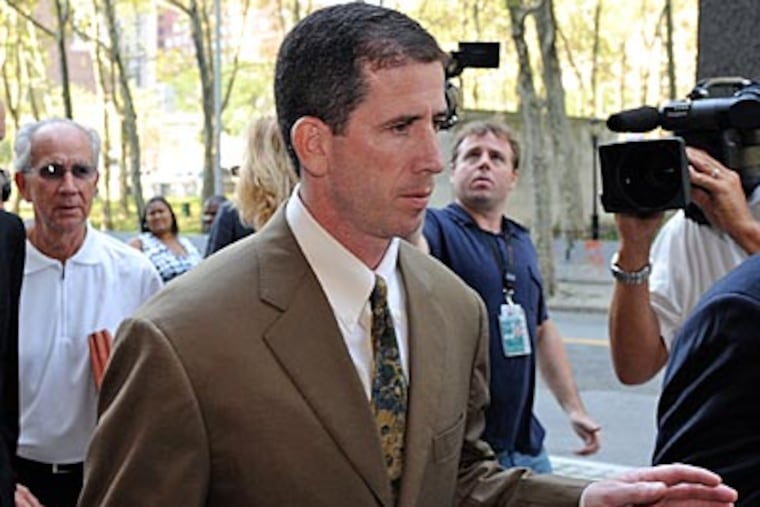Book offers fascinating look into Donaghy scandal
YOU'RE JIMMY BATTISTA, a professional gambler with humongous lines of credit with bookmakers from Singapore to South Philly. You have a rogue NBA referee named Tim Donaghy in your pocket.

YOU'RE JIMMY BATTISTA, a professional gambler with humongous lines of credit with bookmakers from Singapore to South Philly. You have a rogue NBA referee named Tim Donaghy in your pocket.
He's picking winners of games he's officiating (against the spread) and he's hitting at a 78 percent clip, and you're betting with both fists from Taiwan to Timbuktu. He's 37-10 that one magical 2006-07 season, which means you are reading this on the Internet on that Caribbean island you own, sunning yourself beside the Olympic-sized pool alongside your eight-bedroom mansion.
Wrong!!!
"Jimmy lost a fortune playing poker on those offshore sites on the Internet," said Sean Patrick Griffin, a professor of criminal justice at Penn State Abington. He's written "Gaming the Game," a fascinating book about Battista and his role in the NBA scandal. "He was addicted to Oxycontin. He was betting games on his own and even he says he was never a good handicapper. He was millions of dollars in debt, and, even now, he owes significant amounts to many people."
So Battista, who once gulped Oxycontin pills the way some guys munch M&M's, and snorted the occasional line of cocaine, is managing a fitness club in the area. He went through rehab, then did 15 months in a Brooklyn jail, the same sentence Donaghy got in a much softer, minimum-security joint in Florida, which doesn't seem fair at all.
"That infuriated Battista," Griffin said. "The judge said Donaghy was more culpable, the prosecutor said there would have been no scheme without Donaghy. But Timmy cooperated with the feds and Battista did not, so he paid the price."
The book is not a sympathetic portrait of a hood from the 'hood who couldn't bet straight. "This is not 'Jimmy Battista speaks to America,' " Griffin said sternly. "I checked out everything he said and when the research showed he was wrong, I debunked him."
Battista says it all started on a mid-December night at the Philadelphia Airport Marriott. Battista and his pal Tommy Martino met with Donaghy, a mini-Cardinal O'Hara alumni meeting. The referee had been betting on sports with Jack Concannon and was whining loudly about getting stiffed.
Battista says he knew about Donaghy's wagering 3 years earlier and had started copycatting the NBA bets. They hammered out a deal, sitting in a car. Donaghy would call Martino with his pick, using a simplistic code. Battista would shop the bookmaker network, seeking the best betting line. Donaghy was to get $2,000 if his pick won, pay nothing if his pick lost.
He started out 6-0 and was quickly boosted to $5,000 a game. Battista said he never asked Donaghy whether he intended to make spurious calls that would help him cash his "bet."
"He didn't want to know," Griffin said. "Afterwards, he was on [ESPN's] 'Outside the Lines' and they asked him a million different ways if he thought Donaghy fixed games and he said, 'I won't answer that.' It is an ongoing investigation."
Let the record show that Donaghy's numbers are very different. He says that he picked fewer games for Battista and Martino and that his record of picking winners of games he did not officiate was about the same. That would seem to bolster his claim of using "inside information" as opposed to anything he did, or did not do, with his whistle.
The prosecutors are explicit, issuing a letter that says, "There is no evidence that Donaghy ever intentionally made a particular ruling during a game in order to increase the likelihood that his gambling pick would be correct. He has acknowledged, however, that he compromised his objectivity as a referee because of his financial interest in the outcome of NBA games and that this personal interest might have subconsciously affected his on-court performance."
The Pedowitz Report, paid for by the NBA, says "we are unable to contradict the government's conclusion." OK, no evidence that he made wrong calls. Is it possible he didn't make some correct calls that might have influenced the outcome?
Battista drops hints along the way, wondering why Donaghy demanded to know "the number" each night and why he was 1-6 picking games he wasn't involved in. Griffin wonders why the drastic line changes didn't tip off the bookies, the feds, the NBA that something rotten was going on.
Where was the alarm system in Las Vegas that should have reported onesided betting and dramatic movement in the betting lines? After talking to sports book managers in Vegas, Griffin thinks they might have looked the other way, scrambling to get in on the sure thing themselves.
If everybody and his brother-in-law knew what was going on in games Donaghy officiated, where did the bettors find enough unsuspecting bookmakers to take their action? Turns out Battista would start the day betting $50,000 on the wrong team, throwing the copycats off the scent and tilting the point spread in his favor when he was ready to pound the bookies with $200,000 in bets.
And how was a guy unconnected with the mob, married with five kids, always dressed in rumpled sweat suits, able to bet that kind of money? Turns out he worked for two-fisted professional gamblers such as The Chinaman, The Computer and Zorba, searching the Internet for the best odds before placing huge bets for them.
Intriguing stuff, stranger than fiction. *
Send e-mail to stanrhoch@comcast.net.